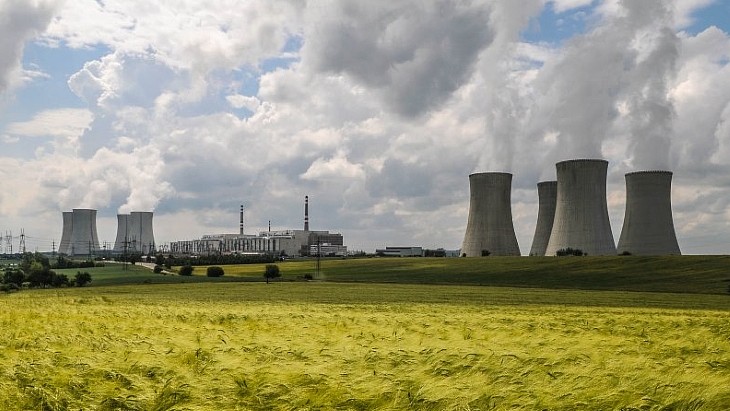The engineering, procurement and construction (EPC) contract was signed on Wednesday, just hours after the Czech Supreme Court annulled a lower court's injunction which had said it should not be signed before a legal challenge to the tender process from fellow bidder EDF was heard.
What is the project?
The Czech government selected Korea Hydro & Nuclear Power (KHNP) as its preferred bidder in July 2024 for two new units near the current Dukovany Nuclear Power Plant, about 200 kilometres southeast of Prague. Two more units at the Temelin Nuclear Power Plant are also being considered and, according to KHNP "if the Czech government decides within the next three years to proceed with Temelin units 3 and 4, KHNP will be eligible to sign additional contracts with EDU II after further negotiations".
As well as the EPC element, the agreement also includes the supply of nuclear fuel for about a decade - the initial fuel load and five reloads.
The project owner is Dukovany II Nuclear Power Plant (EDU II), which is 80% owned by the Czech Government and 20% by CEZ, which operates the country's existing nuclear power plants.
Next steps, and suppliers
Following the signing of the contract KHNP said: "As the main contractor, KHNP plans to deliver the entire EPC, commissioning, and nuclear fuel supply scope of the project together with Team Korea partners: KEPCO E&C (design), Doosan Enerbility (major equipment and construction), Daewoo E&C (construction), KEPCO NF (nuclear fuel), and KEPCO KPS (commissioning and maintenance)."
It said that "following a kick-off meeting, KHNP and EDU II will begin full-scale project execution. KHNP also plans to sign subcontract agreements with each Team Korea member for their respective scopes". It will also host two briefings this year for interested Czech suppliers and said it had "already begun building a construction information system to manage documents, licensing, and schedule from the negotiation phase".
KHNP said that "a site office will be established at Dukovany to support swift mobilisation of expert personnel and the execution of initial work such as site surveys", and EDU II "plans to proceed with design, licensing, and construction preparation procedures in cooperation with KHNP, aiming to start construction of Dukovany unit 5 in 2029".
Czech Industry and Trade Minister Lukáš Vlček said that the initial 30% involvement of Czech companies will increase to "60% involvement by the end of construction". A framework agreement was signed last month, he noted, "for the comprehensive supply of a turbine hall and a contract for the supply of a steam turbine between Škoda Power, KHNP and Doosan. This part of the project, which is highly technologically demanding, can account for up to 15-20% of the total contract volume and will enable the involvement of a number of other companies within the Škoda Doosan Power subcontracting chain".
What does it mean for South Korea?
KHNP noted in its statement that it is the second successful export project after the Barakah project in the UAE and that the country "which once imported European-type nuclear reactors, has now grown into a country capable of exporting reactors to Europe".
KHNP President Hwang Joo-ho said: "This contract is a testament to the international recognition of Korea’s nuclear technology and credibility. KHNP will continue to strengthen the global competitiveness of Korea’s nuclear ecosystem and fulfill its responsibility to future generations by delivering safe and sustainable energy, while also ensuring successful cooperation with the Czech Republic."
What about the legal challenge?
The French company EDF, which lost out in the tender process, has a legal case pending relating to the tender process, which is due to be heard on 25 June. The regional court had issued a temporary injunction barring the signing of the final contract until after the case was heard, but the Czech Supreme Administrative Court annulled it on Wednesday, saying it "considered the public interest in the timely conclusion of the contract and the commencement of the performance of the contract to be significantly more important" than "the interest in preventing the harm threatened to the plaintiff".
EDF's objections to the tender process include the belief that the KHNP offer price and the inclusion of a guarantee that the construction would not be delayed or become more expensive, would be "unfeasible without illegal state aid given the prices in the nuclear industry" and EDF says that if their rival bidder had state support it would breach European Union rules. The European Union is conducting a preliminary review "to assess whether potential foreign financial contributions received by the Party (KHNP) constitute foreign subsidies and, if so, whether those foreign subsidies distort the internal market with respect to the project".
KHNP rejects that case and said the Czech Supreme Administrative Court decision "reaffirms the integrity and transparency of the Czech Republic’s tender process". The EDU II project company said earlier this month that the tender for the supplier of the new nuclear units "was carried out in all phases in a fully transparent manner and under fair conditions". The Czech government says that according to the "expert opinion of the Ministry of Industry and Trade, the EPC contract with the company KHNP was not subject to the Regulation on Foreign Subsidies. This was due to both the nature of the contract itself and the fact that the tender procedure had been initiated before the effective date of this Regulation".
Nuclear power in the Czech Republic
The Czech Republic currently gets about one-third of its electricity from the four VVER-440 units at Dukovany, which began operating between 1985 and 1987, and the two VVER-1000 units in operation at Temelín, which came into operation in 2000 and 2002.





_33198.jpg)
_730_93825.jpg)

_83147.jpg)






